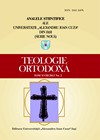Prophecies about Messiah in Psalm 110
Prophecies about Messiah in Psalm 110
Author(s): Petre SemenSubject(s): Christian Theology and Religion
Published by: Editura Universităţii »Alexandru Ioan Cuza« din Iaşi
Keywords: Psalm; Messiah; King; Enthroning
Summary/Abstract: Many of the Scriptures’ exegetes state that, together with Psalm 2, Psalm 110 has been created and chanted in the honor of king David, or, if not, in the honor of one of his successors. The messianic psalms are so called due to their direct referral to the king’s coronation. As smeared with God (I Sam. 24:7, 11; 26: 9, 11, 16; II Sam. 1:14; II Sam. 19:22; Ps. 18:51; 20:7; 84:10; 89:39, 52; 132:10), the king became a consecrated person and he was considered to be participate in God’s Holiness; therefore the king’s person was inviolable. After David, the throne should have been taken by Adonis but God gave it to Solomon (I Kings 2:15; I Chron. 28:15). Being in a special relation with Yahwe, it was believed that the king had special powers and he was called God’s angel and his wisdom is like a God’s angel (I Sam. 29:9); but he was not considered a God (II Kings 5:7; Ezekiel 28:2, 9). Even though Psalm 110 has some elements in common with other royal psalms (2; 18; 20-21; 45; 72; 132), the former is, as Alonso Schökel states, the psalm of a king written for a king. Some psalms talk about the moment of matrimony (Ps. 45), the gratitude towards Yahwe for a military victory (Ps. 18:21) or the begging of the divine help for the salvation of the king or his military success (Ps. 20). Through the same prophet, the Davidic dynasty was promised eternal life (II Samuel 7:16, 29; 23:5; Ps. 89:3-4, 29-39) and the relation between Yahwe and the king, similar to a father-son relationship will also last forever (II Samuel 7:14; Ps. 2:7).
Journal: Analele Ştiinţifice ale Universităţii »Alexandru Ioan Cuza« din Iaşi. Teologie Ortodoxă
- Issue Year: 2013
- Issue No: 2
- Page Range: 7-22
- Page Count: 16
- Language: English

